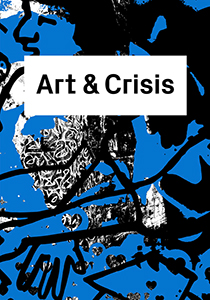A polyphonic research into contemporary,
Art & Crisis is the first volume of a new series aiming to explore the state of the world and cultural theories as seen through the lens of contemporary artistic practices and educational tools. Stemming from the Master Fine Arts at the Zurich University of the Arts, and edited by MFA director
Donatella Bernardi, the series' ambition is to replace the traditional “degree show” catalogue with a theoretical publication showing the path followed by the students-turned-artists over the course of the year, and to explore how an educational institution based in Zurich can locate itself within the global (art) world.
For this first volume, artistic, philosophical, and visual essays, as well as contributions by the MFA students and its professional participants are gathered together under the umbrella title
Art & Crisis. A theoretical publication on educational processes and what it means to teach and learn fine arts in a city such as Zurich, this book also reflects on the field works made by the MFA students in 2017 in Athens, Beirut, and Lesbos. From a reflection on “baroque
brutalism” held in an interview with German artist Florian Dombois about the ZHdK building, and documents and interviews reporting the encounters with different professionals (a Beirut-based NZZ correspondant, Greek artists and curators, a Lebanese rapper from Tripoli, NGO volunteers in Lesbos), to an essay by Brazilian philosopher Rodrigo Nunes on “
Politics as Pedagogy,” and a consideration of the relationship between artistic practices and activism in our changing global world by American cultural critic
T.J. Demos, for Bernardi an MFA today is not only about learning, producing, and exhibiting, but also about thinking its position and modalities in the international network of fine art schools and how it can be part of an “virtuous” international cultural ecosystem.
Other contributions include a conversation between Swiss curators Judith Welter and Ian Wooldridge about the 2017 MFA Degree Show, visual and text contributions by MFA faculty members Dominique Lämmli and Erik Steinbrecher, as well as an essay by MFA graduate student Caroline Ann Baur on the possible futures of
femininity. The book's graphic design embodies the stakes of the publication through its wide system of cross-references, as well as its use of political activist Rini Templeton's pictograms.






